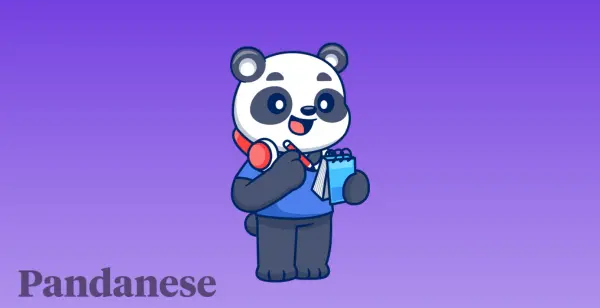
10 Common Chinese Verbs Every Newbie Learner Should Know
Learning Chinese can be difficult due to its tones, character recognition, and complex stroke order.
But unlike most languages, building up and learning Chinese vocabulary is quite easy. To help you to make communication easier and help you express yourself clearly.
A summary of Chinese verbs
Let’s look at two key grammar features regarding Chinese verbs:
1. Chinese verbs don’t conjugate
Verbs in Chinese maintain their form when being used in past, present, and future sentences.
For example in English, we would say “He worked,” “He works,” and “He will work.” Instead, Chinese verbs work in a way where there is no conjugation. So the translation in Chinese would be, “He works.”
So Chinese grammar will use additional words to indicate whether an action is completed or not.
2. The Chinese verb position in a sentence is as follows : Subject + Verb + Object.
This sentence format is the most common and basic Chinese sentence structure where the verb will be placed between subjects and objects (e.g., I drink water). Quite similar to English.
How many verbs do Chinese have?
There is no exact number of verbs in the Chinese language. Instead, it relied on combining Chinese characters, modifying ones, and adding particles to express actions.
As such, the Chinese language is quite flexible in this regard.
Your Chinese English dictionary may not categorize a Chinese character as a verb, noun, or adjective as it can be changed with other characters and words depending on the context.
10 Common Mandarin Chinese Verbs that Every Newbie Learner Should Know
While the Chinese language does not have a definite number of verbs, there are key simple standalone Chinese verbs.
Here is a list of Chinese verbs that all native Chinese speakers will start learning along with its Chinese pinyin.
1. 吃 (chī): to eat
Example: 我在吃米饭. (Wǒ zài chī mǐfàn.) – I am eating rice.
Common phrases using 吃 (chī):
吃完 (Chī wán): to finish eating
好吃 (Hào chī): good to eat, delicious
吃饭 (Chī fàn): to have a meal
This verb in Chinese is easy to remember because it has the mouth 口 (kǒu) radical. It reminds us of food and eating.
2. 喝 (hē): to drink
Example: 我喝茶. (Wǒ hē chá.) – I drink tea.
Common phrase using 喝 (hē):
吃喝 (Chī hē): to eat and drink
喝醉 (Hē zuì): to get drunk
The character, 喝 (hē), also features the mouth 口 (kǒu) radical on the left. To memorize this character, look at the sun radical 日 (rì) on the top right-hand side. It looks like a man 人 (rén) resting in the shade and drinking because of the heat.
3. 去 (qù): to go
Example: 我去中国. (Wǒ qù zhōngguó.) – I go to China.
Common phrases using 去 (qù):
出去 (Chū qù): to go out
死去 (Sǐ qù): to die
失去 (Shī qù): to lose
去年 (Qù nián): last year
As you can see with this Chinese verb, 去 (qù) is used in a combination of other Chinese characters to create other verbs.
You can use your imagination and understand the meaning of these words. Let’s use the verb “to die” in Chinese. Combining that hanzi for death (死) and go (去), or going to death, can and does mean to die.
4. 有 (yǒu): to have
Example: 我有一个苹果. (Wǒ yǒu yīgè píngguǒ) – I have an apple.
Common phrases using 有 (yǒu):
没有 (Méi yǒu): no, to not have
只有(Zhǐ yǒu): only
还有 (Hái yǒu): and, also, in addition to
Use 有 (yǒu) when you have, carry, or describe a certain amount you have.
5. 要 (yào): to want
Example: 他要书. (Tā yào shū.) – He wants books.
Common phrase using 要 (yào):
重要 (Zhòng yào): important
要是 (Yào shi): if
不要 (Bù yào): do not want, must not
This Chinese hanzi 要 (yào) means important, shall, and to want as anything you want is important.
6. 拿 (ná): to take
Example: 请拿咖啡. (Qǐng ná kāfēi.) – Please take the coffee.
Common phrases using 拿 (ná):
拿走 (Ná zǒu): to take away
捉拿 (Zhuō ná): to arrest
拿起 (Ná qǐ): to pick up
Using this Chinese verb, 拿 (ná)—to take, can be used in a lot of contexts. Such as in arrest and pick up when you take something away in the right context.
7. 给 (gěi): to give
Example: 请把书给我. (Qǐng bǎ shū gěi wǒ) – Please give me the books.
Common phrases using 给 (gěi):
还给 (Hái gěi): to return, to give back
交给 (Jiāo gěi): to hand over
写给 (Xiě gěi): write to somebody
The opposite of 拿 (ná)—to take is 给 (gěi)—to give. This verb in Chinese is perfect when you’re at any street food and want to say something along the lines of “give me two of these.”
8. 爱 (ài): to love
Example: 我爱他. (wǒ ài tā.) – I love him.
Common phrases using 爱 (ài):
爱国 (Ài guó): patriotic
爱人 (Ài rén): spouse
可爱 (Kě’ài): cute, adorable
This character 爱 (ài) is written in simplified Chinese while it is written as 愛 in traditional Chinese. The main difference between the two characters is that the simplified version does not have the component, 心 (xīn), meaning “heart.”
While 爱 (ài) and love is the typical verb you think of, it uses a range of words and expressions to convey different shades of meaning.
9. 是 (shì): to be
Example #1: 我是一个老师. (Wǒ shì yī gè lǎo shī.) – I am a teacher.
Example #2: 时间就是金钱. (Shíjiān jiù shì jīnqián.) – Time is money.
Common phrases using 是 (shì):
不是 (Bù shì): no
但是 (Dàn shì): but, however
The ‘to be’ verb 是 (shì) is such an essential word, and every Chinese-language learner will be taught this during their very first Chinese Mandarin lessons. Here are the general rules you should be aware of when using the verb 是 (shì):
Used to express and describe people
Used to connect nouns: noun+ shì+ noun
NOT used to connect adjectives
NOT used to describe the state of the present continuous tense (e.g., I am reading Pandanese blogs.)
In Chinese, the character 是 (shì) can also sometimes mean ‘yes’ or ‘correct’.
10. 问 (wèn): to ask
Example: 我能问你一件事吗? (Wǒ néng wèn nǐ yī jiàn shì ma?) – Can I ask you something?
Common phrases using 问 (wèn):
访问 (Fǎng wèn): to access
学问 (Xué wèn): knowledge
问题 (Wèn tí): problem, question
This character is made of two radicals: 门 (mén) means gate and 口 (kǒu) means mouth. A gate would remind us of a house, a building, or a place in general. When you’re lost, you should open your mouth and ask for directions to find the place. How does that mnemonic sound to you?
Frequently asked questions
Do Chinese verbs have tenses?
No. Chinese has no verb conjugation or verb tenses. Instead, there are key time words such as yesterday, now, or tomorrow for example will indicate the sentence tenses.
What are the verb endings in Chinese?
Chinese verb endings do not change. There is no conjugation in the Chinese language.
In closing
Learning these essential Chinese verbs will help you communicate what you are trying to say. And knowing the most common Chinese verbs will let you speak Chinese and find new ways to create new vocabulary.
Keep this Chinese verbs list to add to your repertoire.
The easiest way to learn Chinese & build vocabulary

